- AVI Musica Autentica
- The Creation
- Ludvig Norman
- Ukraine
- Arpaviva Foundation Inc
- Eugene Onegin
- piano quartet
- Ann Schein
 PODCAST: John Dante Prevedini leads a discussion about Classical Music and Visual Disability, including contributions from Charlotte Hardwick, Robert McCarney, Halida Dinova and Giuseppe Pennisi.
PODCAST: John Dante Prevedini leads a discussion about Classical Music and Visual Disability, including contributions from Charlotte Hardwick, Robert McCarney, Halida Dinova and Giuseppe Pennisi.
 VIDEO PODCAST: John Dante Prevedini leads a discussion about Classical Music and Artificial Intelligence, including contributions from George Coulouris, Michael Stephen Brown, April Fredrick, Adrian Rumson and David Rain.
VIDEO PODCAST: John Dante Prevedini leads a discussion about Classical Music and Artificial Intelligence, including contributions from George Coulouris, Michael Stephen Brown, April Fredrick, Adrian Rumson and David Rain.
Sisters Under the Skin
MIKE WHEELER is impressed with Opera North's production of 'Ariadne auf Naxos'
Richard Strauss's Ariadne auf Naxos is part love-letter to opera, part spoof. Hugo von Hoffmansthal's libretto grew out of his adaptation of Molière's Le Bourgeois Gentilhomme, in which the title character puts on an entertainment for his guests, with a tragic opera and a commedia dell'arte troupe. The twist is that, in order to be finished in time for the firework display that marks the evening's grand finale, the shows have to be shortened and staged simultaneously. The announcement throws everything into chaos. The revised version, the one usually performed, gives us backstage drama in the Prologue; the second part is the Opera itself, with the comic characters butting in.
Opera North's joint production with Gothenburg Opera, who first staged it in 2018, locates the action in a 1960s film studio, with a Fellini-like director in charge - there are visual references to Fellini's classic 1963 film 8½ in the Opera - with the two films having to be shot back-to-back.
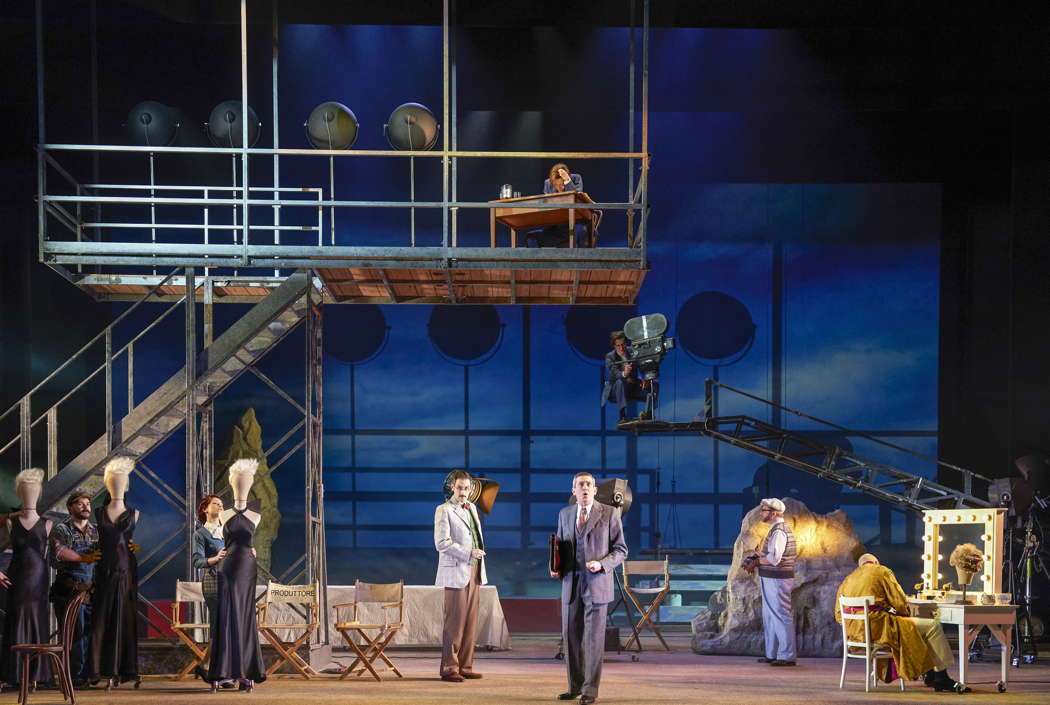
John Savournin (left) as the Major-Domo, Dean Robinson as the Music Master and Hanna Hipp as the Composer (top) with the Company of Ariadne auf Naxos in Opera North's production of the Richard Strauss opera. Photo © 2023 Richard H Smith
Director Rodula Gaitanou filled the stage with bustle and artistic temperament, during the orchestral prelude as well as the Prologue itself, sung in a mixture of German, English - translation by Christopher Cowell - and Italian.
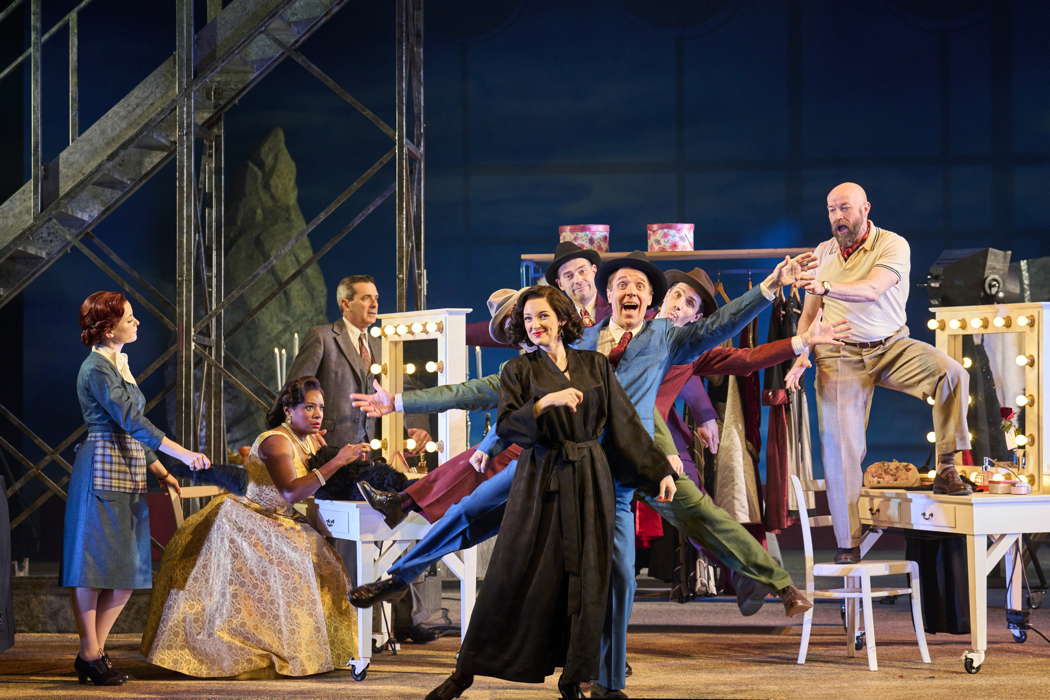
From left to right: Laura Kelly-McInroy as Dresser, Elizabeth Llewellyn as Prima Donna, Dean Robinson as Music Master, Jennifer France as Zerbinetta, Adrian Dwyer as Brighella, Alex Banfield as Scarmuccio, Simon Grange as Truffaldino (double) and Daniel Norman as Dancing Master in Opera North's Ariadne auf Naxos. Photo © 2023 Richard H Smith
In the Prologue (and the Opera - see below), Hanna Hipp was convincingly boyish as the Composer, protesting at his masterpiece being hacked about to fit the new time frame, without overdoing the petulance.
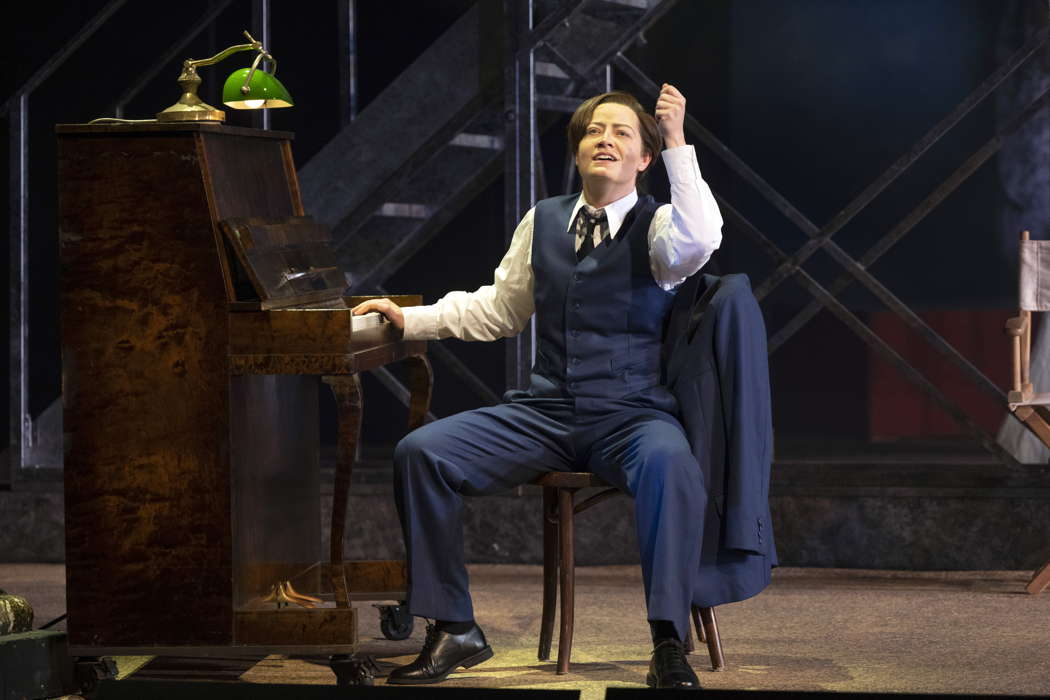
Hanna Hipp as the Composer in Opera North's Ariadne auf Naxos. Photo © 2023 Richard H Smith
Dean Robinson as his tutor, the Music Master, had his work cut out trying to calm him down. Elizabeth Llewellyn as the Prima Donna and David Butt Philip as the Tenor were imperious to a fault, each plotting behind the other's back to try and get the other's aria cut, rather than their own.
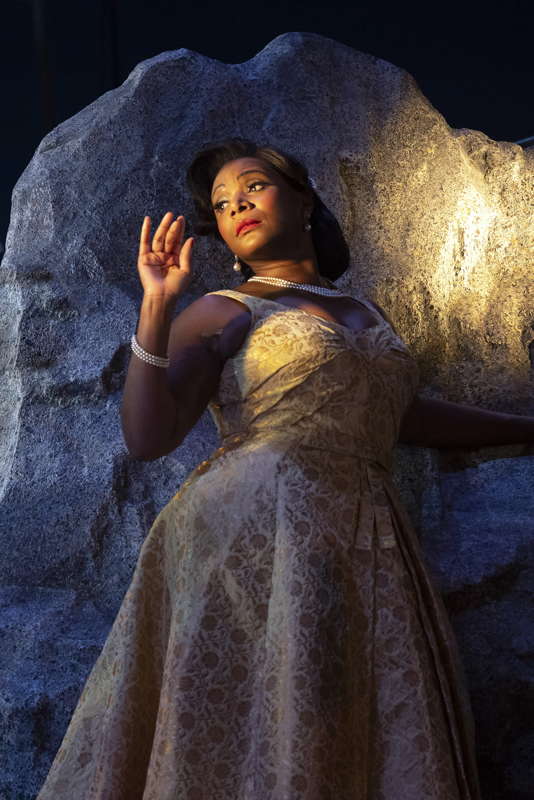
Elizabeth Llewellyn as the Prima Donna in Opera North's Ariadne auf Naxos. Photo © 2023 Richard H Smith
The four clowns - John Savournin (Truffaldino, also the Major-Domo in the Prologue), Dominic Sedgwick (Harlequin), Alex Banfield (Scaramuccio) and Adrian Dwyer (Brighella) - formed a lively, cohesive troupe, with Jennifer France coquettish but also sympathetic as their soubrette, Zerbinetta.
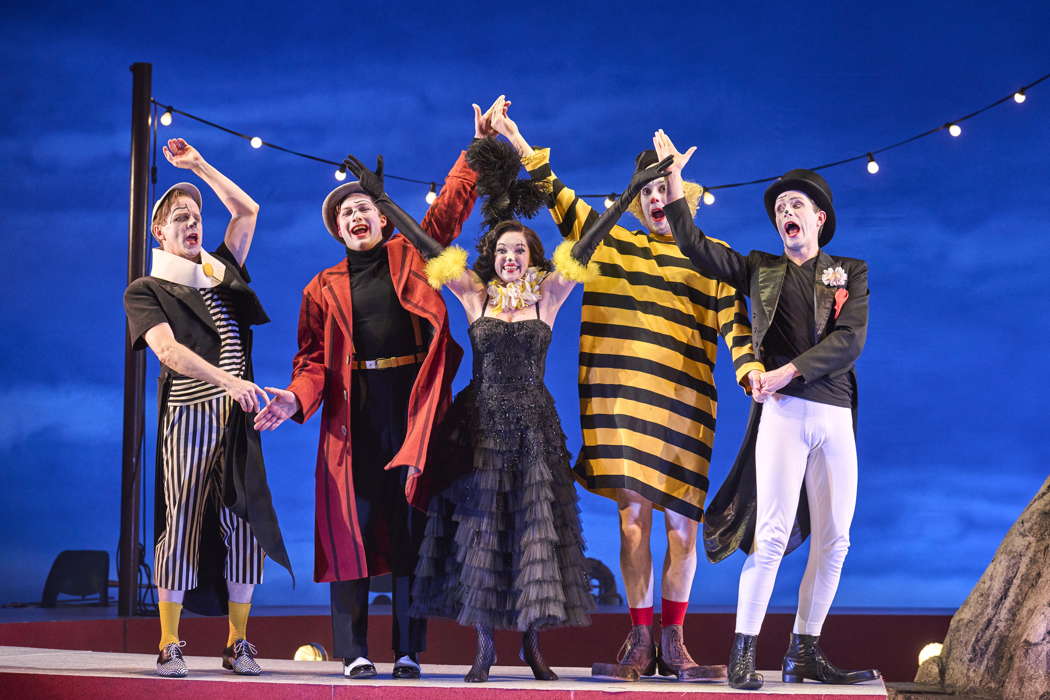
From left to right: Adrian Dwyer as Brighella, Dominic Sedgwick as Harlequin, Jennifer France as Zerbinetta, John Savournin as Truffaldino and Alex Banfield as Scaramuccio in Opera North's Ariadne auf Naxos. Photo © 2023 Richard H Smith
The Opera's overture was launched by a solo strings passage of real tenderness, emblematic of the orchestral playing and Antony Hermus's conducting, both exemplary throughout. Two film cameras were on stage to record both sets of action, beginning with the three nymphs - Daisy Brown, Laura Kelly-McInroy and Amy Freston - watching over the sleeping Ariadne, constantly making watery movements with their arms, like the Rhinemaidens that Strauss no doubt had in mind. Indeed, this was not the only allusion to Wagner's Ring cycle in this production, with Ariadne asleep not in the original scenario's cave-mouth but on a rock, as she waits to be rescued by a heldentenor, whose mother, the Nymphs tell us, died in childbirth.
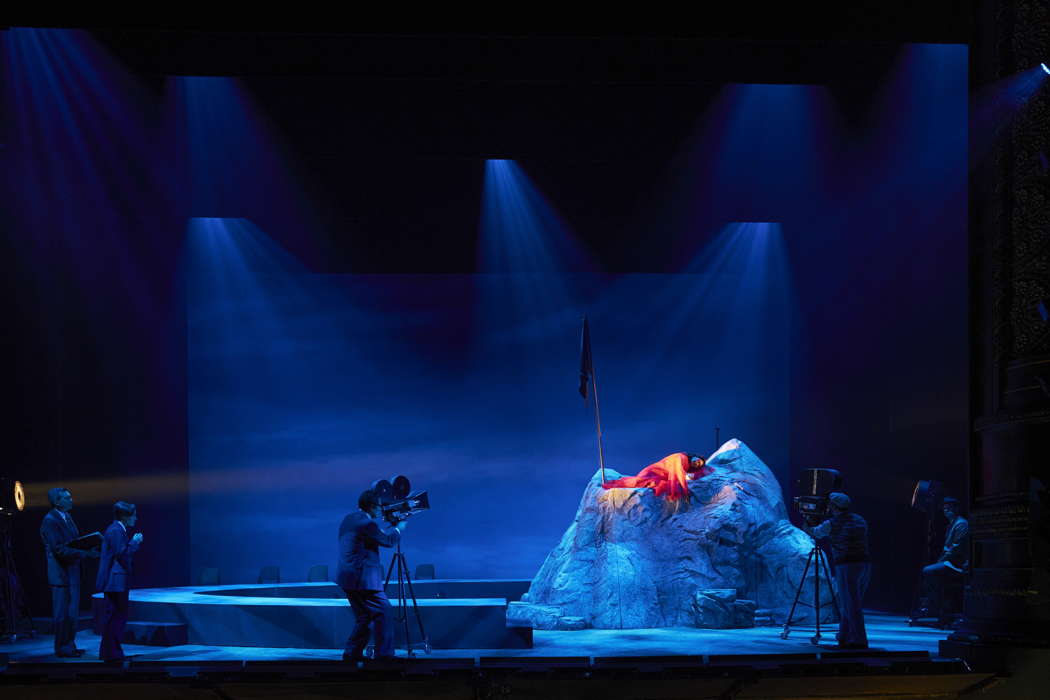
Elizabeth Llewellyn as Ariadne with members of the Chorus of Opera North in Opera North's Ariadne auf Naxos. Photo © 2023 Richard H Smith
Elizabeth Llewellyn's dark, contralto-ish lower register came into its own in her big aria, 'Es gibt ein Reich', as the abandoned Ariadne longs for death.
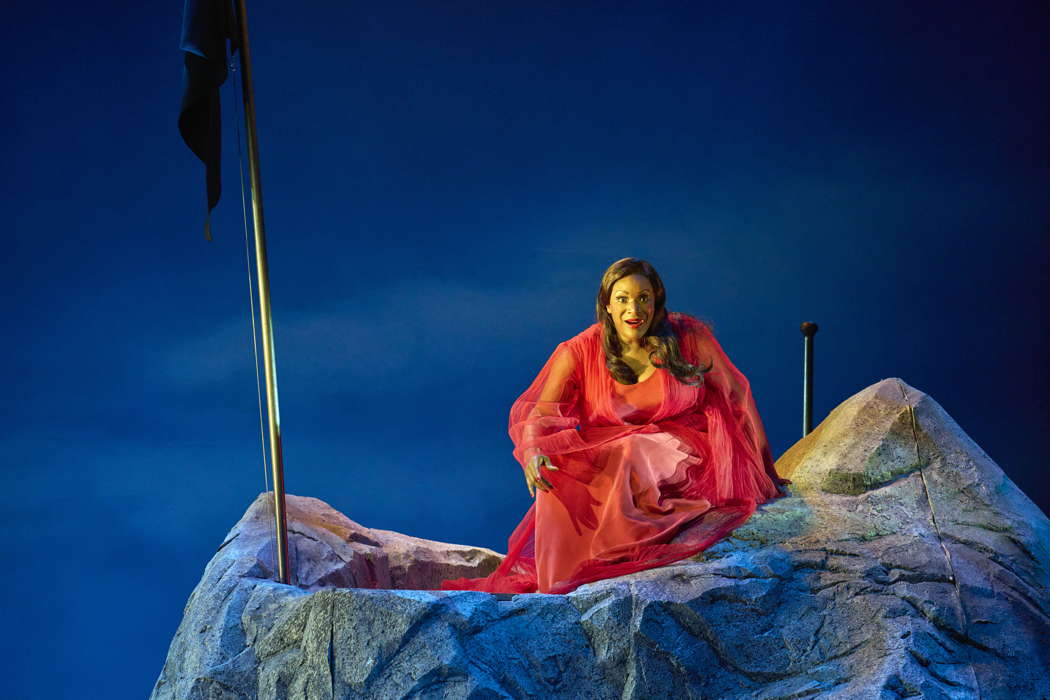
Elizabeth Llewellyn as Ariadne in Opera North's Ariadne auf Naxos. Photo © 2023 Richard H Smith
Jennifer France tackled head-on the spectacular coloratura of 'Grossmächtige Prinzessin', her attempt at teaching Ariadne some worldly wisdom.
Bacchus' entry - in a bronze mock-up of a ship's prow, mounted on a camera crane - had quiet authority, and though his white suit and the golden wreath round his head prompted an unfortunate (or was it deliberately parodic?) reminiscence of Albert Herring, it was easily put out of mind as David Butt Philip's powerful delivery took command of the role. The culminating Bacchus-Ariadne duet was one big, glorious surge of tone.
Rodula Gaitanou's production was both genuinely funny and touching as it got under the skin of the characters' complexity. In a tweak to the original scenario that made perfect sense, the Composer joined the film-crews to watch, taking over part of Harlequin's original role, as his and Zerbinetta's mutual attraction, which began in the Prologue, blossomed. Ariadne and Zerbinetta, we realised, are sisters under the skin.
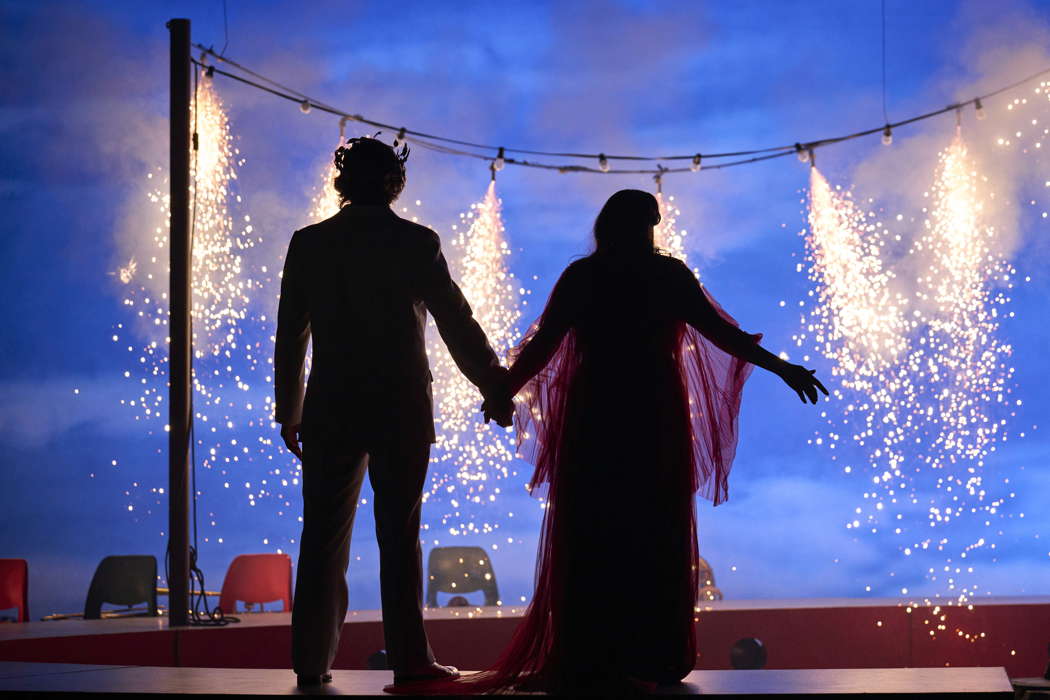
Bacchus and Ariadne at the end of Opera North's Ariadne auf Naxos. Photo © 2023 Richard H Smith
And there were real fireworks at the end.
Copyright © 29 March 2023
Mike Wheeler,
Derby UK



